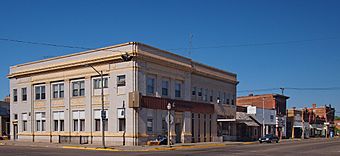Canby Commercial Historic District facts for kids
Quick facts for kids |
|
|
Canby Commercial Historic District
|
|

Part of the Canby Commercial Historic District
|
|
| Location | Roughly 1st and 2nd Streets and St. Olaf Avenue, Canby, Minnesota |
|---|---|
| Area | 7.5 acres (3.0 ha) |
| Built | 1892–1930s |
| Architectural style | Art Deco, Italianate |
| NRHP reference No. | 80002189 |
| Designated HD | November 25, 1980 |
The Canby Commercial Historic District is a special part of Canby, Minnesota. It's like a time capsule of old buildings. These buildings were built between 1892 and the 1930s. They show us what the town's main street looked like long ago. This area was added to the National Register of Historic Places in 1980. This means it's an important historical site in the United States.
Contents
What is the Canby Commercial Historic District?
The Canby Commercial Historic District is a group of 24 historic buildings. These buildings are called "contributing properties." This means they help tell the story of the district's past. They are located mainly on 1st and 2nd Streets and St. Olaf Avenue. This area was the heart of business in Canby for many years.
Why is this District Important?
This district is important because it shows how towns in western Minnesota grew. Many towns faced big fires that destroyed their main streets. Canby was one of them. After these fires, new buildings were put up. The buildings in this district are great examples of how towns rebuilt themselves. They also show how Canby became a major trading center for the area.
A Look at the Buildings
The buildings in the district were built between 1892 and the 1930s. You can see different styles of architecture. Some buildings show the Italianate style. This style often has tall windows and decorative details. Other buildings might show the Art Deco style. Art Deco buildings often have sleek lines and geometric shapes. These different styles tell us about the time periods when they were built.
Canby's Role as a Trade Center
Canby was a very important place for trade in its region. Farmers and other businesses from nearby areas came to Canby. They would buy and sell goods here. The buildings in the historic district were once busy shops, banks, and offices. They were places where people met to do business. This made Canby a lively and important town.
Rebuilding After Fires
Many towns in the late 1800s and early 1900s faced the danger of fire. Buildings were often made of wood. If a fire started, it could spread quickly. Canby experienced some big fires that damaged its downtown. But the people of Canby worked hard to rebuild. The buildings we see today are a sign of their strength and determination. They show how the town kept growing even after tough times.



